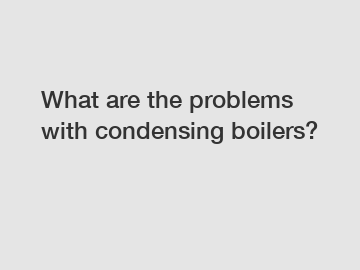What are the problems with condensing boilers?
What are the problems with condensing boilers?
Condensing boilers have become increasingly popular in recent years due to their energy efficiency and lower carbon footprint. However, they are not without their problems and limitations. In this article, we will explore the issues associated with condensing boilers, their causes, and the significance and impact of these problems.
One of the primary problems with condensing boilers is their susceptibility to freezing during cold winter months. The high efficiency of these boilers is achieved through condensing water vapor in the flue gas, which produces acidic condensate. This condensate needs to be drained properly to prevent blockages and freezing. If the condensate pipe is not insulated or protected adequately, it can freeze, leading to the shutdown of the boiler and potential damage.

The freezing issue with condensing boilers can be attributed to several factors. One of them is the location of the condensate pipe. In many installations, the pipe is exposed to external elements, making it vulnerable to freezing temperatures. Additionally, inadequate insulation or insufficient protection can increase the risk of freezing. Furthermore, poor system maintenance and neglecting to clear any potential blockages in the pipe can exacerbate the problem.
The significance of this problem lies not only in the inconvenience caused by boiler shutdowns but also in the potential damage that freezing can inflict on the equipment. When the condensate freezes, it expands, which can lead to cracks or bursts in the pipes. This can result in costly repairs and downtime, especially during the cold months when heating is most essential. Consequently, it is crucial for homeowners and installers to address this issue proactively by ensuring proper insulation and protection of the condensate pipe.
Another problem associated with condensing boilers is the effectiveness of energy savings in real-life scenarios. While condensing boilers are highly efficient under ideal conditions, they may not always achieve their maximum efficiency in typical household settings. Factors such as inconsistent heating demands, the lack of system optimization, or inadequate control settings can limit the boiler's energy-saving potential.
The impact of this issue is two-fold. Firstly, homeowners may not fully benefit from the expected cost savings and lower energy consumption they anticipated when investing in a condensing boiler. Secondly, the overall carbon reduction potential of condensing boilers may be compromised if their efficiency is not optimized in real-life operation. Therefore, it is crucial for homeowners to consider system design, installation, and regular maintenance to ensure that condensing boilers perform as intended.
In conclusion, condensing boilers offer significant energy efficiency and environmental benefits. However, their vulnerability to freezing and potential suboptimal performance in real-life scenarios are notable problems. By addressing these issues through proper insulation, protection, system optimization, and regular maintenance, the effectiveness and benefits of condensing boilers can be maximized. Homeowners and installers must be aware of these challenges to make informed decisions and ensure the smooth operation of condensing boilers.
Want more information on Best Exhaust Gas Steam Generator, HRSG Boiler Manufacturers, Vertical Waste Heat Boiler? Feel free to contact us.

Comments